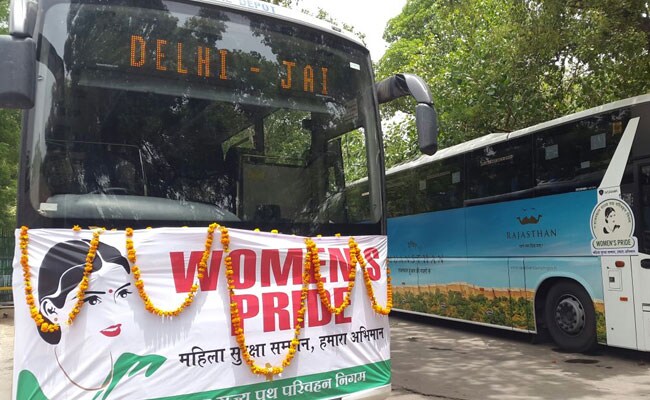The panic button in the Rajasthan buses have been installed in front, so are the CCTV cameras.
New Delhi:
A panic button, vehicle tracking system and closed-circuit television - that's what a group of 20 buses in Rajasthan have been fitted with. And it will soon be mandatory for all buses to have to these safety features, Union Minister Nitin Gadkari said, after flagging off one of the new buses in Delhi.
The government, he said, will issue a formal order in June. The Rajasthan government's move is a pilot project.
The button has been placed next above the door in the front of the bus. Pressing it will send a message to a control room in Jaipur, mentioning the bus registration number and its location. The nearest police station will then be alerted, said Yunus Khan, Rajasthan's Transport Minister, who was also present on the occasion.
The features have been prompted by the horrific gang-rape of student Jyoti Singh, dubbed Nirbhaya, in a moving bus in Delhi in December 2012. Part of the funding comes from the Nirbhaya fund - the Rs 10 billion corpus set up by the Central government in 2013. The rest has been provided by the government of Rajasthan.
 The panic button in buses follows the Central government's move, ordering the installation of mandatory panic buttons in cellphones from January 1 next year. Installation of GPS in phones is the next move - made mandatory from January 2018.
The panic button in buses follows the Central government's move, ordering the installation of mandatory panic buttons in cellphones from January 1 next year. Installation of GPS in phones is the next move - made mandatory from January 2018.
Safety features in buses had been under discussion for long. The Delhi government has installed closed-circuit television and vehicle tracking system in some buses. The idea of placing marshalls in government buses was also considered.
Refering to the death of Jyoti Singh, Mr Gadkari, who attended the function, said, "What happened in the past (Nirbhaya case) is unfortunate". "We want to ensure that women feel safe when they travel," he said.
"I think it's a very good move," said passenger Uzma Bano, adding, "It will give more confidence to those women who travel alone. Mobility and safe travel are very important."
The government, he said, will issue a formal order in June. The Rajasthan government's move is a pilot project.
The button has been placed next above the door in the front of the bus. Pressing it will send a message to a control room in Jaipur, mentioning the bus registration number and its location. The nearest police station will then be alerted, said Yunus Khan, Rajasthan's Transport Minister, who was also present on the occasion.
The features have been prompted by the horrific gang-rape of student Jyoti Singh, dubbed Nirbhaya, in a moving bus in Delhi in December 2012. Part of the funding comes from the Nirbhaya fund - the Rs 10 billion corpus set up by the Central government in 2013. The rest has been provided by the government of Rajasthan.

20 buses in Rajasthan have been installed with Panic buttons and CCTV cameras.
Safety features in buses had been under discussion for long. The Delhi government has installed closed-circuit television and vehicle tracking system in some buses. The idea of placing marshalls in government buses was also considered.
Refering to the death of Jyoti Singh, Mr Gadkari, who attended the function, said, "What happened in the past (Nirbhaya case) is unfortunate". "We want to ensure that women feel safe when they travel," he said.
"I think it's a very good move," said passenger Uzma Bano, adding, "It will give more confidence to those women who travel alone. Mobility and safe travel are very important."
Track Latest News Live on NDTV.com and get news updates from India and around the world

